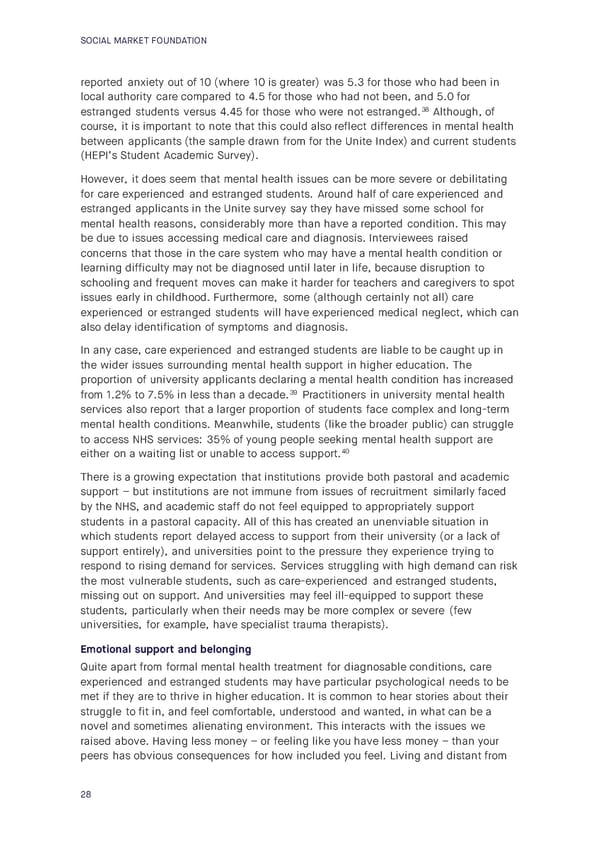SOCIAL MARKET FOUNDATION reported anxiety out of 10 (where 10 is greater) was 5.3 for those who had been in local authority care compared to 4.5 for those who had not been, and 5.0 for estranged students versus 4.45 for those who were not estranged.38 Although, of course, it is important to note that this could also reflect differences in mental health between applicants (the sample drawn from for the Unite Index) and current students (HEPI’s Student Academic Survey). However, it does seem that mental health issues can be more severe or debilitating for care experienced and estranged students. Around half of care experienced and estranged applicants in the Unite survey say they have missed some school for mental health reasons, considerably more than have a reported condition. This may be due to issues accessing medical care and diagnosis. Interviewees raised concerns that those in the care system who may have a mental health condition or learning difficulty may not be diagnosed until later in life, because disruption to schooling and frequent moves can make it harder for teachers and caregivers to spot issues early in childhood. Furthermore, some (although certainly not all) care experienced or estranged students will have experienced medical neglect, which can also delay identification of symptoms and diagnosis. In any case, care experienced and estranged students are liable to be caught up in the wider issues surrounding mental health support in higher education. The proportion of university applicants declaring a mental health condition has increased from 1.2% to 7.5% in less than a decade.39 Practitioners in university mental health services also report that a larger proportion of students face complex and long-term mental health conditions. Meanwhile, students (like the broader public) can struggle to access NHS services: 35% of young people seeking mental health support are either on a waiting list or unable to access support.40 There is a growing expectation that institutions provide both pastoral and academic support – but institutions are not immune from issues of recruitment similarly faced by the NHS, and academic staff do not feel equipped to appropriately support students in a pastoral capacity. All of this has created an unenviable situation in which students report delayed access to support from their university (or a lack of support entirely), and universities point to the pressure they experience trying to respond to rising demand for services. Services struggling with high demand can risk the most vulnerable students, such as care-experienced and estranged students, missing out on support. And universities may feel ill-equipped to support these students, particularly when their needs may be more complex or severe (few universities, for example, have specialist trauma therapists). Emotional support and belonging Quite apart from formal mental health treatment for diagnosable conditions, care experienced and estranged students may have particular psychological needs to be met if they are to thrive in higher education. It is common to hear stories about their struggle to fit in, and feel comfortable, understood and wanted, in what can be a novel and sometimes alienating environment. This interacts with the issues we raised above. Having less money – or feeling like you have less money – than your peers has obvious consequences for how included you feel. Living and distant from 28
 Care and Learning in Higher Education Page 28 Page 30
Care and Learning in Higher Education Page 28 Page 30